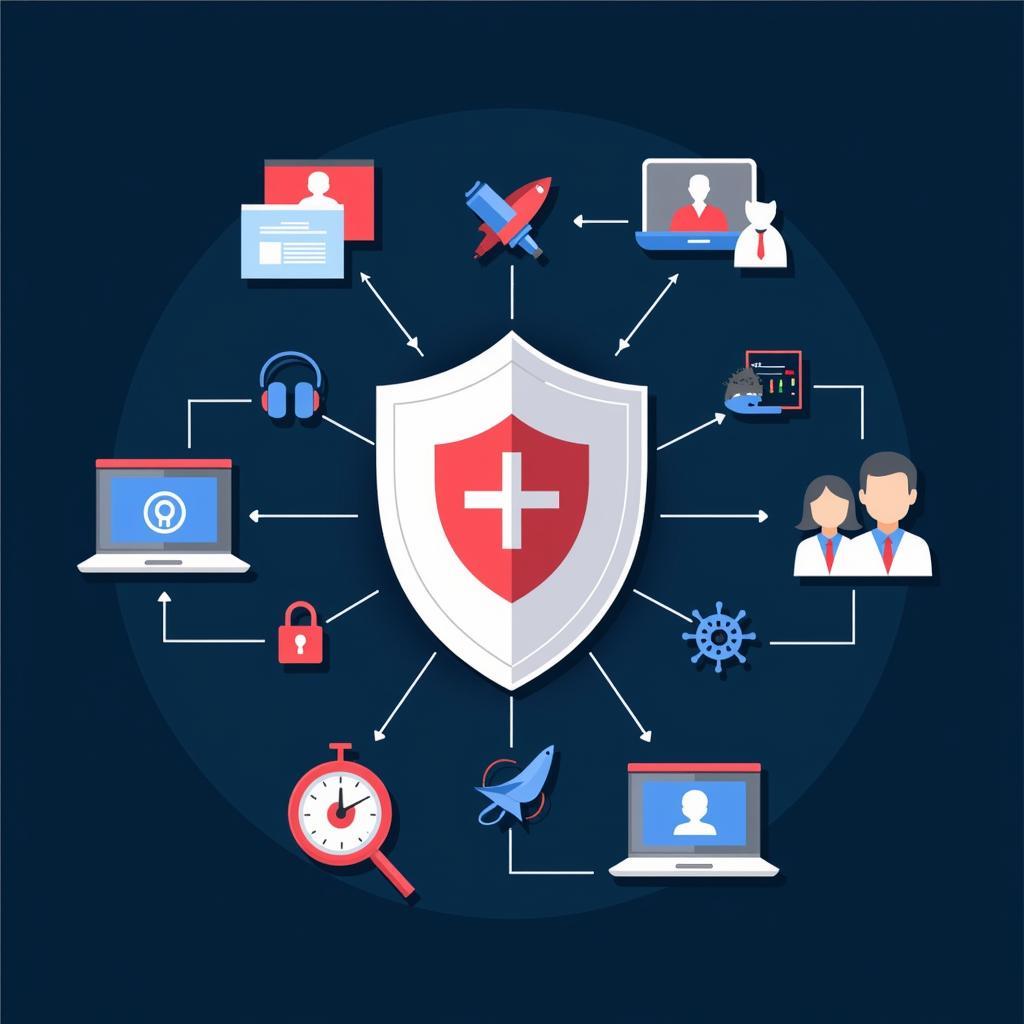Health Care Cyber Security Tools are crucial for safeguarding sensitive patient information and ensuring the integrity of medical systems. In today’s interconnected world, healthcare organizations face increasing cyber threats, making robust security measures essential. This article explores the importance of these tools, the various types available, and how to choose the right solutions for your organization’s specific needs.
Understanding the Need for Health Care Cyber Security Tools
The healthcare industry is a prime target for cyberattacks due to the valuable nature of patient data. This information, including medical records, financial details, and personally identifiable information (PII), can be exploited for financial gain or malicious purposes. Data breaches can have devastating consequences, leading to financial losses, reputational damage, and legal repercussions. Moreover, compromised systems can disrupt patient care, potentially putting lives at risk. Robust health care cyber security tools are therefore essential to mitigate these risks and ensure the confidentiality, integrity, and availability of patient data.
 Protecting Sensitive Patient Data with Cybersecurity Tools
Protecting Sensitive Patient Data with Cybersecurity Tools
Types of Health Care Cyber Security Tools
A comprehensive cybersecurity strategy requires a multi-layered approach utilizing various tools. These include:
- Antivirus and Anti-malware Software: These tools detect and remove malicious software, such as viruses, worms, and Trojans, that can infect systems and compromise data.
- Firewall Protection: Firewalls act as a barrier between internal networks and external threats, blocking unauthorized access and filtering malicious traffic.
- Intrusion Detection and Prevention Systems (IDPS): IDPS tools monitor network traffic for suspicious activity and automatically take action to prevent or mitigate potential attacks.
- Data Loss Prevention (DLP) Solutions: DLP tools prevent sensitive data from leaving the network without authorization, protecting against accidental or intentional data leaks.
- Security Information and Event Management (SIEM) Systems: SIEM systems collect and analyze security logs from various sources, providing real-time visibility into security events and enabling faster incident response.
- Email Security Solutions: These tools protect against phishing attacks and other email-borne threats, ensuring that sensitive information is not compromised through email communication.
Choosing the Right Health Care Cyber Security Tools
Selecting the right tools requires a thorough assessment of your organization’s specific needs and vulnerabilities. Consider the following factors:
- Size and Complexity of Your Organization: Larger organizations with complex IT infrastructures require more sophisticated tools than smaller clinics.
- Specific Threats and Vulnerabilities: Identify the most likely threats your organization faces, such as ransomware or phishing attacks, and choose tools that address those specific risks.
- Budget and Resources: Cybersecurity tools can range in price and complexity. Select solutions that fit your budget and available resources.
- Compliance Requirements: Ensure that the chosen tools meet relevant industry regulations, such as HIPAA in the United States.
What are the benefits of using health care cyber security tools?
Using robust cyber security tools offers several significant benefits:
- Enhanced Data Protection: Protect sensitive patient information from unauthorized access and breaches.
- Improved Regulatory Compliance: Meet industry regulations and avoid penalties.
- Increased Operational Efficiency: Prevent disruptions to critical systems and maintain smooth operations.
- Enhanced Reputation and Trust: Demonstrate a commitment to patient privacy and security, building trust with patients and stakeholders.
“Investing in robust health care cyber security tools is not just a technological necessity but an ethical imperative. It’s about protecting the privacy and well-being of our patients and upholding the trust they place in us.” – Dr. Emily Carter, Cybersecurity Expert.
Conclusion
Health care cyber security tools are essential for protecting sensitive patient data and ensuring the integrity of medical systems. By implementing a comprehensive cybersecurity strategy using a range of tools and best practices, healthcare organizations can mitigate risks, maintain compliance, and build trust with patients and stakeholders. Choosing the right health care cyber security tools is a critical step in safeguarding the future of healthcare.
FAQ
- What are the most common cyber threats to healthcare organizations?
- How can I ensure my organization is HIPAA compliant?
- What is the role of employee training in cybersecurity?
- How often should cybersecurity tools be updated?
- What are the consequences of a data breach in healthcare?
Have more questions or need help with your car key copy tool? Contact us via WhatsApp: +1(641)206-8880, Email: [email protected] or visit us at 910 Cedar Lane, Chicago, IL 60605, USA. Our customer service team is available 24/7. You might also find these resources helpful: ways to improve health care infomatics tools, iowa total care provider tools and advance system care advance pc tool.

Leave a Reply